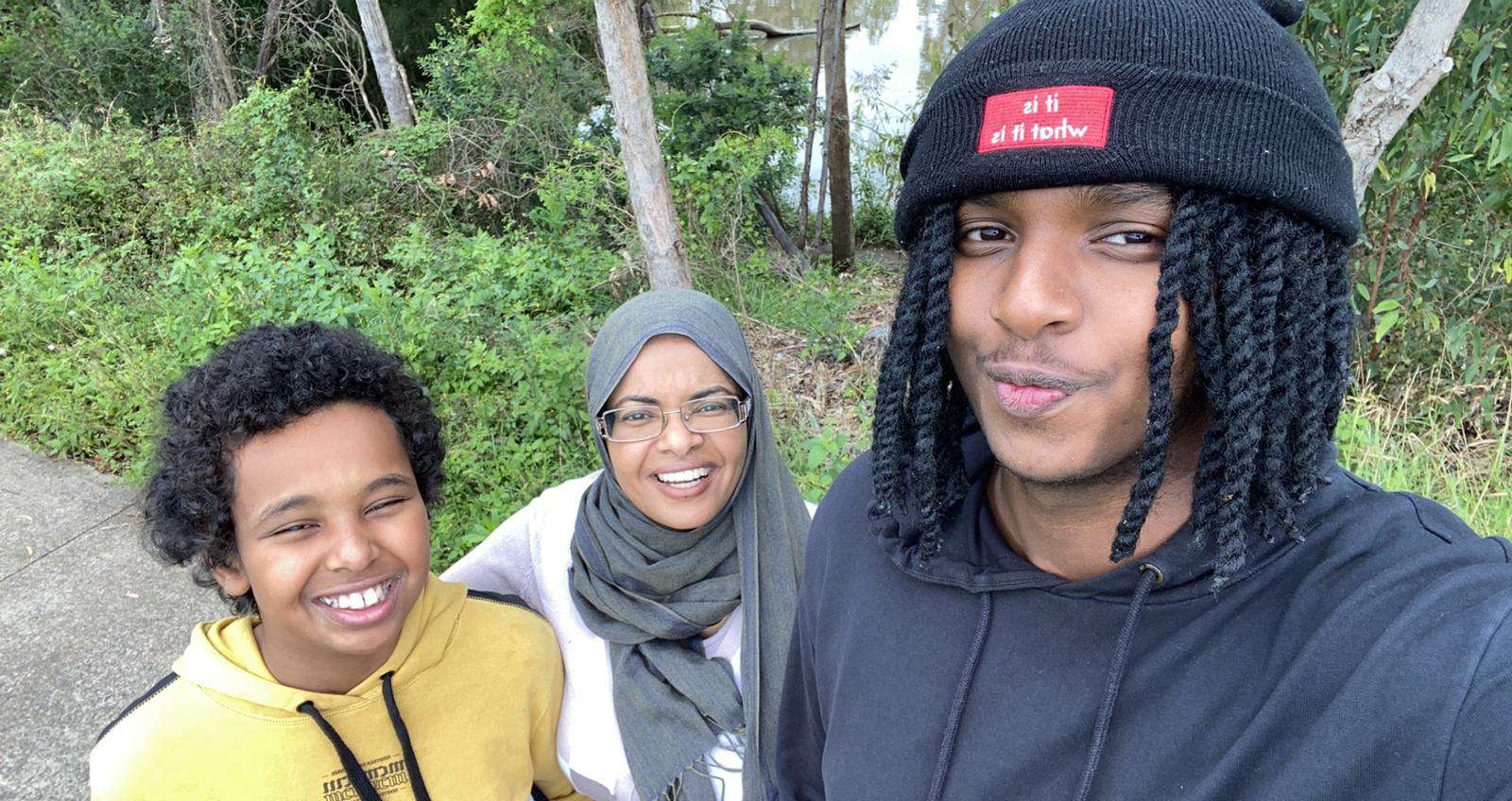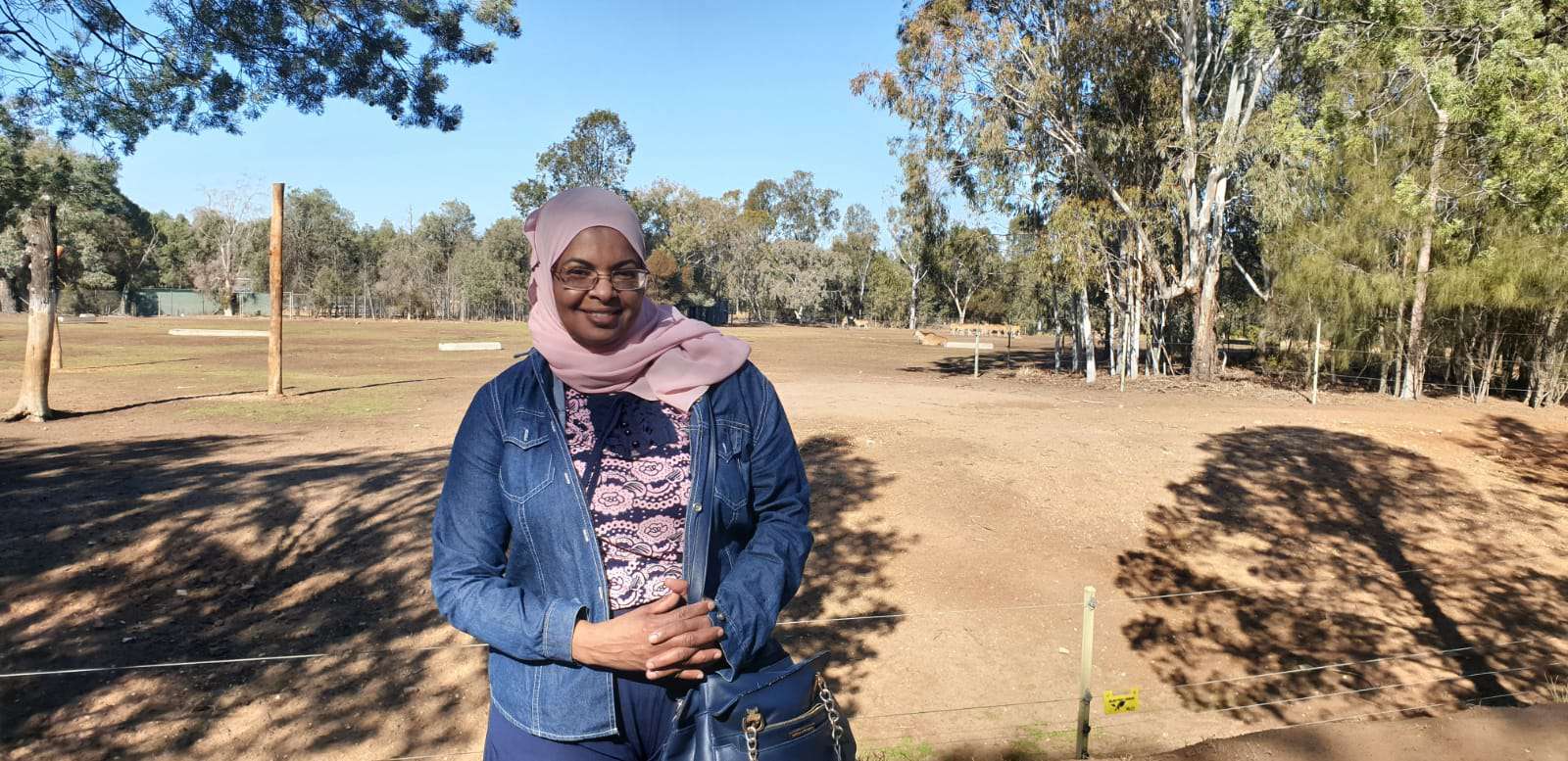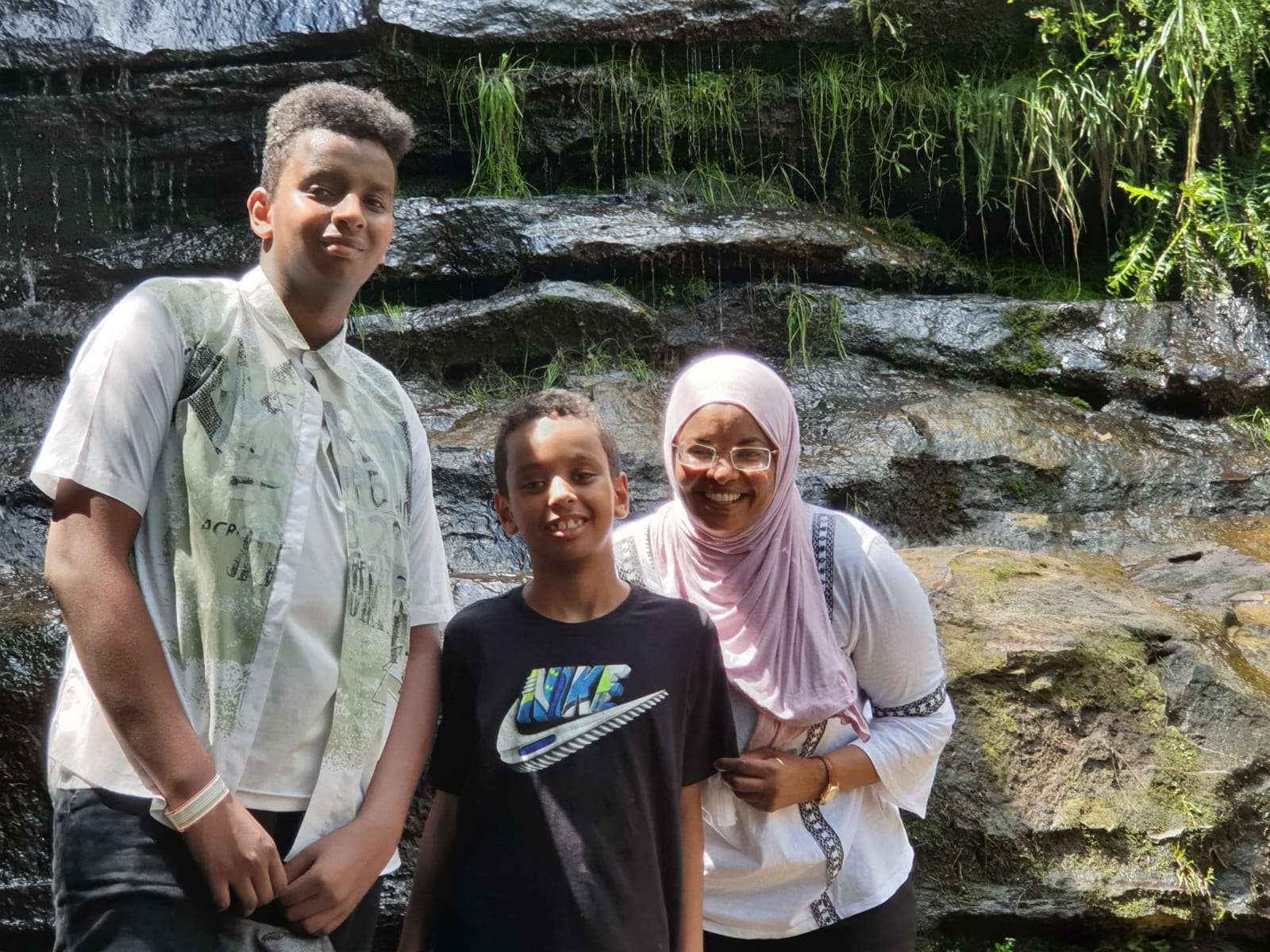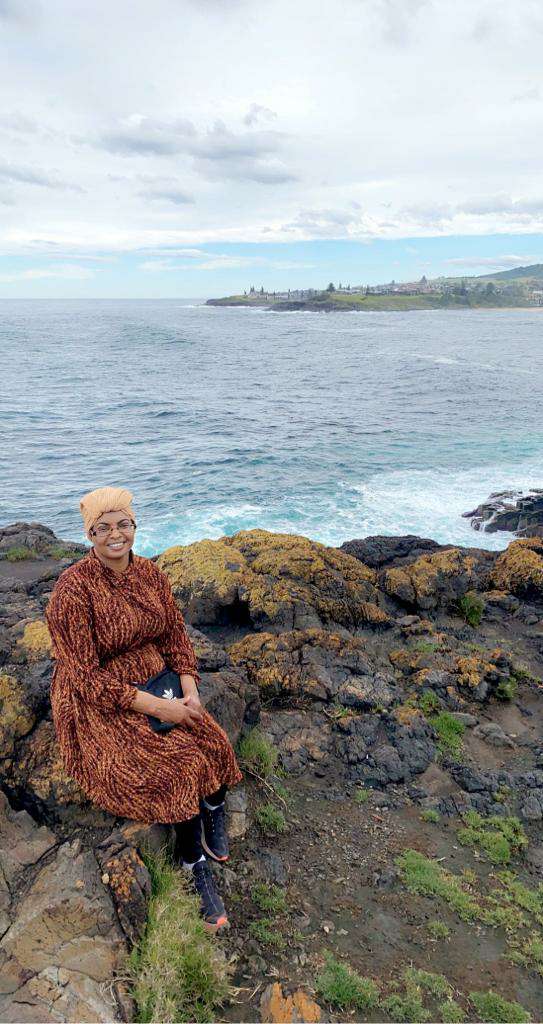Arriving in Australia from Sudan in 2011, Dr Ahlam (or Alanah) Ibrheem never expected that, a decade later, she would be a driving force in helping Sydney’s Sudanese community to get safely through a global pandemic...and get vaccinated.
But helping people has always been a priority for the RVTS registrar, who is currently completing her first year of GP training at Wilton, on Sydney’s southern rural outskirts, after time spent working as a doctor at Forbes and Parkes in central west NSW.
Alanah spoke with Patrick Daley about her work during the pandemic, and opportunities it has delivered for preventive healthcare for the local Sudanese community. She also spoke about her time working in Aboriginal health at Forbes, and why she'd love to return there one day.
 Dr Ahlam (Alanah) Ibrheem with her two sons, Hashim (left) and Yasir (right).
Dr Ahlam (Alanah) Ibrheem with her two sons, Hashim (left) and Yasir (right).
I was raised in Khartoum, the capital of Sudan.
I came from a big family – four sisters and five brothers.
I am the first doctor in my family, and even as a kid my dad used to call me ‘doctor’ all the time.
I have always loved rural places, and visited many villages during my work as a GP with the Ministry of Health’s malaria control program in Sudan.
Coming from a poor country, helping people was my measure of a good life. I love to help and I love to talk! General Practice enabled me to be in touch with people.
One of my interests in Sudan was mental health. In our culture, people don’t talk about it as it carries a big stigma. I wanted to try to break that stigma by doing education sessions in the community.
Why did you move to Australia?
My husband came to Australia before we got engaged – I was still studying. When I graduated, the plan was for me to come here too. But I felt a duty of care to look after my people. My dad was a bit older and he wasn’t happy for me to move far from him. So it was not until seven years later that I came here, after my dad passed away.
I also came to Australia to do further study and see another part of the world. I felt we could have the best quality of life here too.
I have two sons – my oldest, Yasir, is sixteen and my youngest, Hashim, is ten. My husband has been living back in Sudan since last year.
I don’t think I could go back to Sudan now. I’m settled and happy here.
At the time I was in Sudan, the resourcing of the health system wasn’t the best but it was better than it is now. One day I referred a child with a brain injury to the hospital, but the child died because there was no ICU. That was very depressing for me – if you have the will to do something, but the resources are very limited, that makes your job harder. People think that, as a doctor, you can always ‘save the day’, but there are limitations if you don’t have enough resources.
What was your first role in rural Australia?
My first medical placement was at Forbes, with the Yoorana Gunya Family Healing Centre Aboriginal Corporation.
The style of practice in Aboriginal health is very similar to that in Sudan, in terms of cultural norms – for example, avoiding eye to eye contact (particularly when talking about sensitive topics). There is also a strong culture around respecting your elders.
I really enjoyed working at Yoorana Gunya because I knew how to work within that type of culture.
We also have similarities in the types of diseases and conditions that impact us.

How difficult was it mixing in the local communities at Parkes and Forbes?
I was worried at the beginning, but the locals were lovely and very respectful. It was very easy for me to make friends there. They reminded me of back home in Sudan; neighbours visiting each other, and waving and smiling in the street – I had missed that living in Sydney.
I also really enjoyed working with the Aboriginal people at the medical service. They were very supportive and I felt very connected to them.
How did you learn about RVTS?
One of the doctors at Yoorana Gunya, Dr Claire Cupitt, told me about the RVTS program and I applied. But then I had to move back to Sydney for family reasons, so I re-applied to RVTS once I started working as a doctor at Wilton, and was accepted into the program.
My current RVTS Supervisor is Dr Qool Hiwa. He was working in Parkes in my first year there, and is now based not far from me in Sydney. He also completed his Fellowship through RVTS.
He is very supportive and each week we discuss interesting cases I have come across. Whenever I send him a question he replies immediately, and just last weekend he sent me a set of questions on the cardiovascular system...so he is a very committed educator as well!
I feel like RVTS is a family. It’s a very friendly environment, and the study topics are presented in a very professional way. All the sessions have been great, but one of the recent sessions I attended on radiology was amazing. The cultural awareness course was also very helpful, and linked really well with what I was doing at Forbes.
Because many of the registrars studying with RVTS are from overseas, RVTS really reaches out to us in terms of support. And it’s not only about the clinical training – it is also really helpful learning about some of those cultural issues and Australian norms, and even just how the Australian health system works.
You played a pivotal role in helping the Sudanese community in Sydney to stay safe during the COVID lockdowns this year – tell me a little bit about that.
That was a really busy time!
I had heard about some COVID positive cases amongst Sudanese people living in the suburbs. Some of them were not engaged in community messaging because of language and cultural barriers, so I rang them one night to introduce myself and offer support.
I was so busy, it got to midnight and I felt shaky – I suddenly realised I hadn’t eaten since the morning!
That was the start of a very busy three to four months – of having the phone on 24/7, reaching out every day to those newly diagnosed with COVID, taking a short history, and advising them what they should do.
 Thankfully, my fellow members at the Sudanese Australasian Medical Professionals Association (SAMPA) got on board with me to assist. All in all, we ended up having a large group of Sudanese doctors helping out.
Thankfully, my fellow members at the Sudanese Australasian Medical Professionals Association (SAMPA) got on board with me to assist. All in all, we ended up having a large group of Sudanese doctors helping out.
We formed a support group for those people who had tested positive for COVID.
Another doctor and I would phone the COVID positive patients in the morning to check on their medical needs, arrange food deliveries and medications, and organise translation services if required.
We also recorded some COVID safety messages in Sudanese for social media.
The workload kept getting bigger and bigger every day!
On the first day, we were in touch with 28 families – by the time we finished we had reached hundreds.
We started to do regular Zoom webinars, answering COVID-related questions and concerns from the local Sudanese. We asked everyone to get vaccinated. We also spoke with other African cultural groups.
Some were worried about the stigma of COVID – there were even rumours circulating that if you had it and gave it to someone you had to pay them money.
We also had some of the Emergency Department doctors talk at the webinars about COVID symptoms, and the fact that you should call an ambulance if you had severe shortness of breath. Some of our people were finding it hard to call an ambulance due to language barriers.
We knew we needed to convince the mums that the vaccinations were essential. Once the mums agreed to get vaccinated, the husband and children would follow.
Some of the men had no option because of work – they had to be vaccinated. But many of the women weren’t working, so they needed convincing.
We contacted all the Sudanese GPs in Sydney and made a list of those who were providing the vaccinations. SAMPA also arranged a vaccination day for our community’s kids at Sydney Children’s Hospital.
When my son got vaccinated, I made a video for social media. This helped convince many families that it was safe to get the jab. And for those people who were reluctant to be vaccinated, we would speak with them personally to allay their concerns.
By the end of our work, the spread of COVID in our community had virtually stopped – people were aware of the need to isolate if they had symptoms, and 90 to 95% of our community was vaccinated.
Why was it hard getting some people across the line?
Some were concerned about the side effects of the vaccine, and some were worried about long-term complications, including fertility.
Others came from a war background and were worried that the government was trying to insert a tracking device or something with the vaccine. But seeing us as doctors getting the vaccines helped convince people they were safe.
Your work has opened up opportunities to talk with the Sudanese community about preventive healthcare?
 That’s right. Many of our people don’t know their rights in terms of accessing medical care in Australia, so we have taken the opportunity to speak about breast cancer screening and mental health plans. We have also arranged referrals with some GPs to undertake health checks for some families that have experienced the sudden deaths of close relatives.
That’s right. Many of our people don’t know their rights in terms of accessing medical care in Australia, so we have taken the opportunity to speak about breast cancer screening and mental health plans. We have also arranged referrals with some GPs to undertake health checks for some families that have experienced the sudden deaths of close relatives.
In Sudan, you pay fully for your medical care, so many Sudanese assume it is the same here and don’t even try to get screenings, even if they are aware of their importance.
Going forward, we will continue our outreach work, but focus more on preventive screening programs. We have also started to talk with our community about how things work over here – not just in the health system, but in the education system and culturally. Many aren’t aware about what jobs they can do, about opportunities to learn English, and how to become more productive in the community.
I wasn’t aware that we have so many skilled and educated people in our community – like engineering and business graduates – so it has been a good chance for us to connect with each other and work out what we could do more for our community.
You and your colleagues are doing all this work as unpaid volunteers...in your spare time?
Yes, but we are being paid back with respect, and we are thinking about our children too – we have done it all with love and care, as part of our duty to our community and also to Australia. I believe we get a lot from Australia so we have to pay that back.
What are your future plans?
I love Wollongong’s beaches and views, so I will most probably settle there while the boys finish their studies.
But I loved working in Aboriginal health and I can’t stop thinking about going back to Forbes – I had a great time there and I have a real feeling that I belong there.
And I don’t like living in big cities, so if I can find somewhere quiet that will suit me much better!